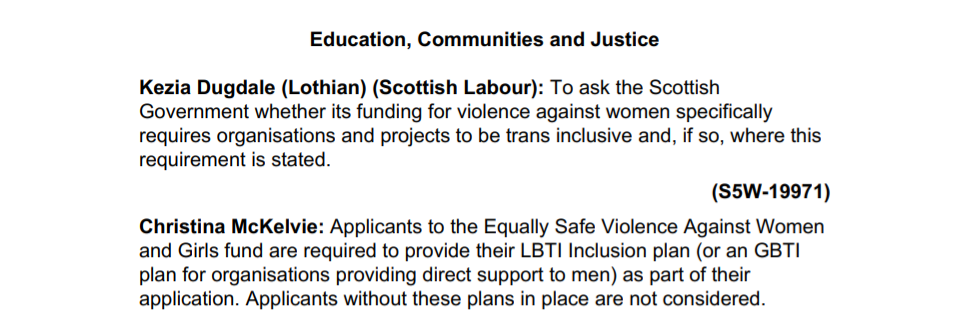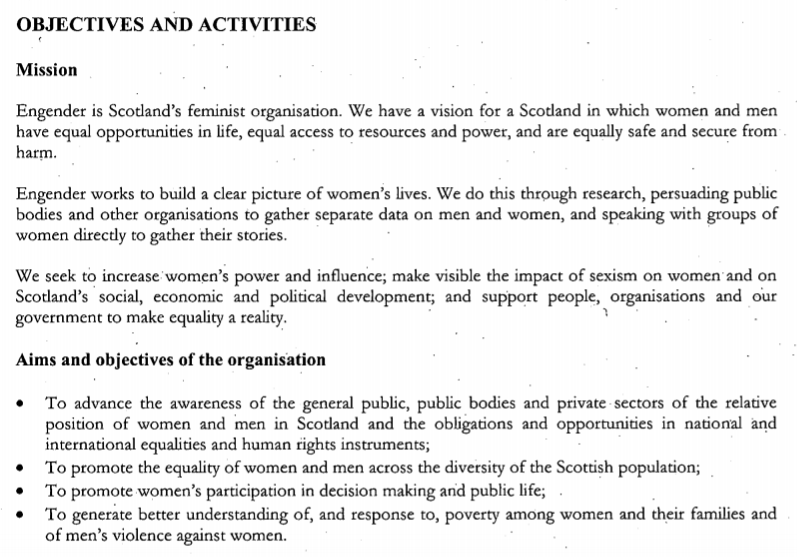Engender
Engender, who describe themselves as Scotland’s feminist organisation, have published an open letter following criticism of themselves and other officially funded women’s groups by MSP Joan McAlpine.
Engender’s opening gambit is to announce that they “neither ‘represent women and girls’, nor make any claim to.” This is quite an admission from a supposedly feminist group and rather begs the question what purpose Engender serves. They state that their “expertise comes from feminist scholarship, evidence drawn from delivery of services and programmes, and work with women and a wide range of women’s groups.” It would appear that Engender’s rather rarified expertise is from a rather narrow version of third wave feminist scholarship, while their “wide range” of women’s groups excludes all those who disagree on points of policy. We should note here that Forwomen.Scot members include those with decades of front line feminist activism – including at Greenham and Faslane and those who campaigned for gay rights when the stigma of AIDS overshadowed the community – as well as lawyers, academics, medics and those involved at the coal face of women’s services.
When Forwomen.Scot applied to join as an organizational member of Engender on 22/08/18, the criteria as published on the website read as follows:

After a long period of delaying tactics, Engender updated their policy to say:
“If you are an organisation which doesn’t work specifically on women’s issues, but support our aims and align with our broader values, we’d love to welcome you as an ‘affiliate member’. Please note, we cannot accept membership applications from single-issue groups that campaign against one of our policy advocacy positions. For example, we would not accept membership from a women’s group that campaigned to restrict access to abortion healthcare, to avoid causing confusion about Engender’s position on that issue.”
In other words, a non-feminist or non-women’s group which agreed to an extent with Engender’s policies could join, but not women concerned that a policy is misguided and could cause intense harm to women’s rights. Shamefully, they categorize us with anti-abortionists.
Engender did indeed say that we could apply for individual membership, however, the criteria for application as an individual is “All self-identified women who agree that they are feminists”. As our members do not “self-identify” as women, they simply are women by virtue of biology, we do not feel that we are eligible to join. We note that, in the open letter they used subtly different language: “membership is open to all women who are willing to tick a box to say they are a feminist.”

Engender claim that they do listen to ordinary women on the topic of self ID. This has come as a surprise to those who intended to attend the Engender meeting on the topic of their support for the change to GRA and of the position of Scottish Trans Alliance (STA). It should be noted that STA have lobbied the government to reform the Equality Act, stating:

Women have repeatedly asked when the meeting will be rescheduled but to no avail. Engender have so far managed to avoid answering. They did, however, release a podcast in which they belittled women’s concerns on the subject.
Engender’s claim that funding for women’s groups is not dependent on trans inclusive policy is interesting in light of the comment made by Emma Ritch of Engender at a Lib Dem fringe meeting at which she is reported to have said that in Scotland VAWG organisations have to be trans inclusive as a condition of funding. She also mentioned that they had been collaborating with other women’s groups to ensure they were all on same page. This is an interesting approach to policy making and, again, highlights the lack of consultation with “ordinary” women. It is also is borne out by the question which Kezia Dugdale put to Christina McKelvie on 4th December 2018:

This is a matter of public record and of Government policy, so to continue to maintain a pretence that it is not, is remarkable.
Forwomen.Scot receive many approaches by those working in sectors with vulnerable women or those who have been adversely affected and even harmed by the policies of official – “respected” – groups. They highlight the lack of consultation, the silencing tactics and refusal to undertake proper research or conduct Equality Impact Assessments. Engender claim they have the evidence to show that change to the GRA will not impact women. In which case, why will they not share it?
The outstanding work of Women and Girls in Scotland has highlighted that the Scottish Prison Service policy developed in concert with STA was indeed done without undertaking an Equality Impact Assessment on the effect on women: SPS have agreed in light of this to review their policy. Women and Girls in Scotland’s work on the schools guidance issued by LGBT Youth Scotland found 11 breaches of the human rights of girls and the Children’s Commissioner has recommended a review. Scotland’s publicly funded feminist organization has not made a comment.
Engender’s government funding of over £200,000 pa is listed on the Government website under the protected characteristic of “gender”:
https://www.gov.scot/publications/equality-national-intermediary-bodies-funding-2017-2020/
Murray Blackburn McKenzie have discovered some concerning applications of law and policy in the Stronger Together document which was developed in partnership by the Scottish Government funded LGBT Domestic Abuse Project, Scottish Women’s Aid (a co-signatory of the Engender letter), the Tayside Violence Against Women Training Consortium and the Scottish Transgender Alliance. They write:
“The guidance also advises that if other service users are uncomfortable sharing a service ‘this is rightly seen as no reason for the trans woman to be moved’, and that in this situation ‘we would work to educate other service users – much in the same way that we would if we received comments regarding other service user’s ethnicity, religious affiliation or sexual orientation’.”
They note that the document does not engage fully with the single-sex provisions of EA2010 stating:
“Under the EqA, a transwoman who does not hold a Gender Recognition Certificate (GRC) is legally male and as such would be treated as male for the purposes of the sex discrimination provision (see Norman (2018) on R (Green) v Secretary of State for Justice [2013] EWHC 3491). Exemptions under the protected characteristic of sex also allow transwomen with a GRC to be excluded from single-sex services and spaces in some circumstances, providing it can be objectively justified. For example, the EqA allows females only (or males only) to be appointed to posts for genuine occupational requirement reasons. More broadly, EHRC guidance states that access for transwomen must be balanced against the needs of other service users.”
Their work is worth reading in full: https://mbmpolicy.wordpress.com/2019/02/22/the-case-for-due-diligence-assessing-and-owning-policy-and-practice/
In light of Engender’s comments about “gender-disaggregated data” and the census, we think it is worth noting a strange change of policy which we found in their published accounts. In accounts filed 8/11/17, they state that part of their mission is to persuade “public bodies and other organisations to gather separate data on men and women”. The following year, this sentence disappears. It would be interesting to see the research – perhaps studies undertaken at the time – which lead Engender the belief that this objective was now redundant.

Ms McAlpine’s tweets have struck a chord with many women across Scotland, the UK and beyond. It has already been ‘liked’ by close to two thousand people and the responses are overwhelmingly positive and speak of relief that a high profile politician has the courage to step-up.
Despite this, Engender would like us to believe that there is no concern in feminist circles that concerted moves are afoot to redefine sex (and, consequently, sexuality), erode women’s rights and remove the protection of single-sex space for the vulnerable. For a group which claims to be motivated by the promotion of equality and protection of women, this is extraordinary.
